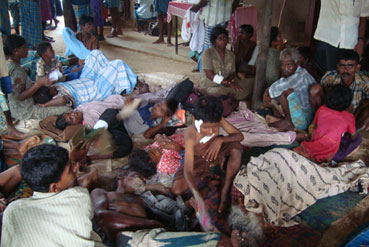
A press release for the new report released today by the international NGO Minority Rights Group detailing how human rights violations are being committed against Muslims and Tamils by the Government of Sri Lanka.
Human rights violations in Sri Lanka continue unabated against ethnic Tamils and Muslims who fear an increasingly nationalist government, a new report by Minority Rights Group International says.
Nearly two years after the end of the war, minorities face daily repression and marginalisation in politics and development policies, particularly in the country’s north and east, documents the report.
The report titled ‘No war, no peace: the denial of minority rights and justice in Sri Lanka’ includes groundbreaking first-hand research from the north and east of the country, including areas that international and national media and NGOs have limited access to.
‘Despite the end of the war, many Tamil and Muslim minorities in Sri Lanka continue to live in fear,’ says Mark Lattimer, Executive Director of MRG.
The report quotes minority political leaders and activists who express serious fear of a state based on Sinhala hegemony. It documents cases of land in traditional Tamil and Muslim areas being seized by military and civilian authorities and used for the construction of everything from military encampments and a power plant to hotels and leisure facilities. The report also expresses concerns by minority activists at the sudden proliferation of Buddhist temples and religious symbols in Tamil and Muslim areas, which they argue is politically sponsored.
In 2009 the Sri Lankan government declared that the country’s 30 year conflict was over after it successfully defeated the Tamil Tiger rebels who had been fighting for a separate homeland for ethnic Tamils. In the immediate aftermath of the war the country faced a huge humanitarian crisis with more than 250,000 people displaced and interned in camps for months.
The report says that while many of those displaced in the last stages of fighting have been moved out of the camps, the resettlement process has not taken place according to international standards. It also stresses the need for the government to provide for the return and resettlement of over 200,000 ‘old displaced’, who lost their homes in earlier stages of fighting. This includes a substantial number of Muslims who were forcibly displaced by the Tigers from the north in 1990.
‘The situation in the resettlement areas in the north and east is very worrying, particularly as international and national media and NGOs have restricted access. There is a high level of militarisation and state control over freedom of movement and association, with local women vulnerable to sexual abuse and harassment,’ says Lattimer.
The report argues that the government is doing little to resolve some of the original minority grievances that led to the conflict, such as violations of physical integrity including torture and enforced disappearances, lack of political autonomy and denial of language rights.
‘The government has made little mention of greater political autonomy for minorities which has always been a key demand of Tamils and Muslims. In fact, the government is now proposing legislation to change the electoral system in a way that threatens to decrease their political representation,’ Lattimer adds.
The report makes a series of recommendations to the Sri Lankan government including asking for a published policy to address minority rights issues, the resumption of all-party negotiations aimed at reaching an agreement on political representation and governance for minorities, and the development of an impartial and credible mechanism for justice and reconciliation in the country.
‘We urge the Sri Lankan government not to lose the opportunity to bring in a lasting peace that can be enjoyed by all communities in Sri Lanka. Justice, reconciliation and human rights protection are essential for peace to become a reality for all,’ Lattimer says.
Notes:
- The full report ‘No war, no peace: the denial of minority rights and justice in Sri Lanka’ is available here.
- Minority Rights Group International (MRG) is a non-governmental organisation working to secure the rights of ethnic, religious and linguistic minorities and indigenous peoples worldwide.
For further information or to arrange interviews please contact the MRG Press Office in London- T: +44 207 4224205 / M: +44 7870596863
See also LoyarBurok’s previous coverage of this issue:-
